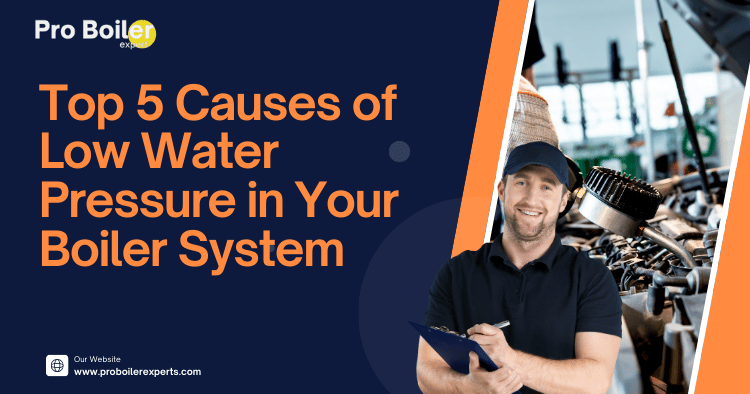Table of Contents
- Understanding Low Water Pressure
- Cause 1: Leaks in the System
- Cause 2: Faulty Pressure Regulator
- Cause 3: Clogged Pipes
- Cause 4: Issues with the Boiler
- Cause 5: Incorrect System Settings
- FAQs about Low Water Pressure
- Conclusion
Understanding Low Water Pressure
Low water pressure in your boiler system can significantly impact heating efficiency and comfort in your home. As of 2024, homeowners are encouraged to regularly check their boiler systems to avoid inefficiencies and potential malfunctions. Understanding the causes of low water pressure is essential for maintaining your boiler system effectively.
Cause 1: Leaks in the System
One of the most common causes of low water pressure is leaks in the boiler system. These leaks can occur in various parts, including pipes, radiators, and valves.
How to Identify Leaks
- Visual Inspection: Look for water stains or damp patches on walls and ceilings, especially near the boiler or radiators.
- Pressure Gauge: A drop in the pressure gauge reading can indicate a leak.
- Unusual Water Bills: A sudden increase in your water bill might suggest water escape.
Solutions
If you suspect a leak, it’s crucial to address it immediately. Depending on severity, you may need to call a professional plumber or heating engineer to fix the issue. For detailed guides on repairing leaks, you can visit the Energy Saving Trust.
Consider exploring the Top 5 Benefits of Choosing Combi Boilers for Your Home for insights into efficient heating solutions.
Cause 2: Faulty Pressure Regulator
The pressure regulator maintains the correct water pressure in your boiler system. If it malfunctions, you may experience low water pressure.
Signs of a Faulty Pressure Regulator
- Inconsistent Pressure: Fluctuations in water pressure may indicate a malfunctioning regulator.
- Visible Damage: Cracks or corrosion on the regulator suggest it needs replacement.
Solutions
Regular maintenance checks can help catch issues with your pressure regulator early. If you suspect it’s not functioning correctly, consult a professional. The American Society of Plumbing Engineers offers valuable resources regarding pressure regulators.
Don’t overlook the importance of a well-functioning pressure regulator; it plays a crucial role in your system’s efficiency.
Cause 3: Clogged Pipes
Over time, pipes can accumulate debris, sediment, and mineral deposits, leading to blockages that restrict water flow, significantly decreasing water pressure in your boiler system.
How to Identify Clogged Pipes
- Reduced Hot Water Flow: If hot water takes longer to reach taps or showers, this could indicate a blockage.
- Unusual Noises: Gurgling or banging sounds in the pipes can signal clogs.
Solutions
Flushing your system and cleaning the pipes can help alleviate this issue. If clogs persist, professional cleaning services may be necessary. For more information on maintaining your plumbing system, check out HomeAdvisor.
Additionally, you may find the Top 5 Benefits of Choosing a System Boiler for Your Home helpful for understanding how different boiler types function and their efficiency.
Cause 4: Issues with the Boiler
Your boiler might itself be the source of low water pressure. Problems such as a malfunctioning pump or internal leaks can disrupt normal system operation.
Common Boiler Issues
- Faulty Circulator Pump: If the pump isn’t working correctly, it may not efficiently circulate water through the system.
- Internal Leaks: Any leaks within the boiler can directly impact water pressure.
Solutions
Regular boiler maintenance is essential to prevent these issues. Schedule annual inspections with a certified technician to ensure everything functions properly. For a comprehensive guide on boiler care, visit Which?.
For more on efficient boiler types, consider reading about the Top 5 High-Efficiency Boilers for Optimal Home Comfort.
Cause 5: Incorrect System Settings
Sometimes, low water pressure is simply due to incorrect settings on your boiler or heating system.
Common Setting Issues
- Low Pressure Setting: Ensure the pressure is set correctly according to the manufacturer’s specifications.
- Expansion Vessel Issues: An unpressurized expansion vessel can lead to low boiler pressure.
Solutions
Consult your boiler’s manual to verify that all settings are correct. If you’re unsure, don’t hesitate to contact a heating professional for assistance.
Remember, proper settings are key to ensuring your boiler operates at peak efficiency.
FAQs about Low Water Pressure
What is considered low water pressure in a boiler system?
Low water pressure is generally considered to be below 1 bar (14.5 psi). Most systems operate best between 1 and 2 bar.
How can I check the water pressure in my boiler?
You can check the water pressure by looking at the pressure gauge on your boiler. If the needle is in the red zone, you likely have low pressure.
Can I fix low water pressure myself?
While some minor issues, like adjusting settings or topping up pressure, can be done by homeowners, it’s best to consult a professional for leaks or significant repairs.
Conclusion
Low water pressure in your boiler system can stem from various causes, including leaks, faulty pressure regulators, clogged pipes, boiler issues, and incorrect settings. Regular maintenance and timely repairs can help prevent these problems and keep your system running efficiently. If you encounter persistent issues, don’t hesitate to reach out to a professional for assistance. A well-maintained boiler system not only ensures comfort but also enhances energy efficiency in your home. For more in-depth information, consider checking resources like the Department of Energy or exploring articles from Pro Boiler Experts for expert recommendations on choosing and maintaining your boiler system.





